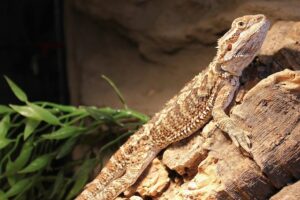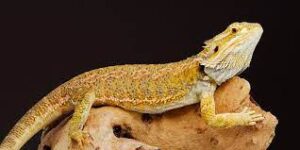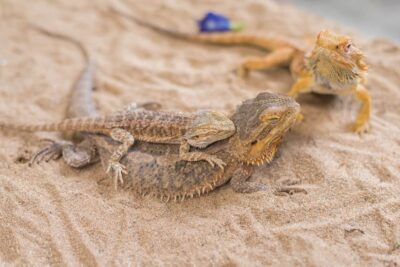Bearded dragons are popular pets known for their calm demeanor and hardy nature. However, like any living creature, they are susceptible to various stressors that can negatively affect their health. The question, “Can stress kill a bearded dragon?” is a valid concern for many pet owners.
While stress alone may not directly cause death, it can lead to a weakened immune system, making bearded dragons more vulnerable to illnesses and complications. In this article, we explore how stress can impact the well-being of bearded dragons, the signs to look out for, and steps owners can take to create a stress-free environment for their scaly companions.
Understanding Stress in Bearded Dragons

Understanding stress in bearded dragons is crucial for their well-being, as it can impact their health and behavior. Here are some key aspects to consider:
Signs of Stress in Bearded Dragons
- Color Changes: Bearded dragons may darken their color or develop stress marks, such as dark lines on their belly or limbs.
- Behavioral Changes: Signs include hiding, decreased appetite, lethargy, aggression, or excessive glass surfing (scratching or pacing along the walls of their enclosure).
- Physical Symptoms: A stressed bearded dragon might show symptoms like weight loss, irregular shedding, or changes in stool.
Common Causes of Stress
- Improper Habitat Conditions: Inadequate temperature, humidity, lighting, or space can cause stress. Bearded dragons require specific temperatures for basking and ambient warmth, as well as UVB lighting for proper health.
- Dietary Issues: A poor diet, irregular feeding schedule, or improper food sizes can stress bearded dragons. They need a balanced diet of insects, vegetables, and occasional fruits.
- Handling and Interaction: Over-handling or rough handling can be stressful, especially if the bearded dragon isn’t accustomed to it.
- Environmental Changes: Changes in their environment, such as a new tank setup, new pets, or loud noises, can be unsettling.
- Illness or Injury: Health issues, including parasites, infections, or injuries, can also cause stress.
Reducing Stress
- Proper Setup: Ensure the enclosure meets their needs with the right temperature gradients, UVB lighting, hiding spots, and appropriate substrate.
- Consistent Routine: Maintain a consistent feeding and lighting schedule to provide stability.
- Gentle Handling: If handling is necessary, do it gently and gradually increase the frequency to help them get accustomed.
- Minimize Changes: Avoid frequent changes in their environment and handle them in a quiet, calm area to reduce stressors.
- Health Monitoring: Regularly check for signs of illness or injury and consult a veterinarian if any concerns arise.
Understanding and managing stress in bearded dragons can help ensure they live a healthy, comfortable life.
Can stress kill a bearded dragon?
Yes, prolonged or severe stress can potentially lead to serious health issues in bearded dragons, which can be fatal if not addressed. Stress can weaken their immune system, making them more susceptible to infections, parasites, and other illnesses. Chronic stress may also lead to:
- Appetite Loss: Persistent stress can cause a bearded dragon to stop eating, leading to malnutrition and weight loss.
- Respiratory Infections: Stress can exacerbate respiratory infections, especially if the enclosure’s temperature and humidity are not properly regulated.
- Metabolic Bone Disease (MBD): A stressed bearded dragon might not bask properly, leading to insufficient UVB exposure and calcium absorption, increasing the risk of MBD.
- Impaction: Stress-related behavioral changes, such as eating substrate or other inappropriate items, can cause impaction, a potentially life-threatening condition where the digestive tract becomes blocked.
It’s important to address the underlying causes of stress and provide appropriate care to maintain the health of bearded dragons. If a bearded dragon shows signs of severe or prolonged stress, consulting with a veterinarian experienced in reptile care is recommended.
Common Stressors and How to Minimize Them

Identifying and minimizing common stressors is key to ensuring the well-being of bearded dragons. Here are some typical stressors and ways to reduce their impact:
1. Improper Environmental Conditions
- Temperature and Lighting: Bearded dragons require a specific temperature gradient and UVB lighting. Incorrect temperatures can stress them and affect their health.
- Minimizing Stress: Ensure the enclosure has a proper temperature gradient, with a basking spot around 95-110°F (35-43°C) and a cooler area around 75-85°F (24-29°C). Use a UVB light suitable for reptiles and replace it regularly as it loses effectiveness over time.
- Humidity Levels: High humidity can lead to respiratory issues, while too low humidity can cause dehydration and shedding problems.
- Minimizing Stress: Maintain humidity levels between 30-40%. Use a hygrometer to monitor humidity and adjust it by misting the enclosure lightly or using a dehumidifier if necessary.
- Enclosure Size and Setup: An enclosure that is too small or lacks proper hiding spots can cause stress.
- Minimizing Stress: Provide an appropriately sized enclosure (at least 40 gallons for adults) with hiding spots, climbing branches, and a substrate that is easy to clean and safe.
2. Dietary and Feeding Issues
- Inappropriate Diet: An imbalanced diet lacking in essential nutrients can stress a bearded dragon.
- Minimizing Stress: Offer a balanced diet consisting of insects (like crickets, mealworms, and dubia roaches) and a variety of vegetables. Avoid feeding insects that are too large, as they can cause impaction.
- Feeding Schedule: Irregular feeding times can cause anxiety.
- Minimizing Stress: Establish a consistent feeding schedule, typically daily for juveniles and every other day for adults.
3. Handling and Interaction
- Overhandling: Excessive handling, especially in young or new bearded dragons, can be stressful.
- Minimizing Stress: Limit handling sessions and allow the bearded dragon to become accustomed to you gradually. Be gentle and calm during handling.
- Sudden Movements or Loud Noises: Bearded dragons can be startled by sudden movements or loud noises.
- Minimizing Stress: Keep their enclosure in a quiet area and approach them slowly. Avoid placing their enclosure near loud electronics or busy areas.
4. Changes in Environment
- Relocation or New Setup: Moving to a new enclosure or significant changes to their habitat can be stressful.
- Minimizing Stress: Introduce changes gradually, allowing them time to adjust. Provide familiar items like hides or decorations to help them feel secure.
5. Presence of Other Pets
- Predatory Animals: The presence of other pets, especially predatory ones like cats or dogs, can cause stress.
- Minimizing Stress: Keep other pets away from the enclosure and ensure the enclosure is secure and provides hiding spots where the bearded dragon can feel safe.
6. Health Issues
- Illness or Injury: Physical discomfort from illness or injury can stress a bearded dragon.
- Minimizing Stress: Regularly monitor for signs of illness or injury, such as changes in appetite, behavior, or appearance. Consult a veterinarian if any health issues are suspected.
Preventive Measures and Care Tips
o ensure the health and well-being of bearded dragons, it’s important to take preventive measures and follow proper care guidelines. Here are some key tips:
Preventive Measures
- Regular Health Checks
- Observation: Regularly observe your bearded dragon for any signs of illness or stress, such as changes in appetite, behavior, or physical appearance.
- Veterinary Visits: Schedule routine check-ups with a veterinarian who specializes in reptiles. This helps in early detection of potential health issues.
- Proper Diet and Nutrition
- Balanced Diet: Provide a balanced diet consisting of a variety of insects and vegetables. Juveniles require more protein, while adults need more vegetables.
- Supplementation: Use calcium and vitamin supplements to prevent deficiencies, particularly calcium to avoid metabolic bone disease.
- Optimal Habitat Conditions
- Temperature and Lighting: Maintain proper temperature gradients and UVB lighting in the enclosure. This is crucial for digestion, metabolism, and overall health.
- Cleanliness: Keep the enclosure clean to prevent infections. Regularly clean and disinfect the habitat, including food and water dishes, decorations, and the substrate.
- Minimize Stressors
- Handling: Handle your bearded dragon gently and consistently to build trust. Avoid over-handling, especially with new or young dragons.
- Quiet Environment: Keep the enclosure in a calm, quiet area to reduce stress from loud noises and sudden movements.
- Safe Enclosure Setup
- Secure Enclosure: Ensure the enclosure is secure to prevent escape and protect from other pets.
- Proper Size and Layout: Provide adequate space for your bearded dragon to move, bask, and hide. Include branches, rocks, and hides to simulate a natural environment.
Care Tips
- Hydration
- Water Source: Always provide fresh water in a shallow dish. While bearded dragons get much of their hydration from food, they should always have access to water.
- Misting: Occasionally mist your bearded dragon and the enclosure, particularly during shedding, to help with hydration and shedding.
- Shedding Assistance
- Bathing: Provide shallow baths to assist with shedding, especially if your bearded dragon has difficulty shedding completely. This can also help with hydration.
- Handling Practices
- Support: Always support your bearded dragon’s body, particularly the limbs and tail, during handling.
- Regular Interaction: Interact with your bearded dragon regularly to keep them accustomed to handling, which can reduce stress.
- Enrichment
- Mental Stimulation: Provide environmental enrichment, such as varied terrain, new objects, and occasional safe, supervised time outside the enclosure.
- Varied Diet: Occasionally offer different types of safe foods to provide variety and enrichment.
- Monitor Behavior
- Activity Levels: Monitor your bearded dragon’s activity levels and basking behavior. A sudden decrease in activity or interest in basking could indicate health issues.
Conclusion
Can stress kill a bearded dragon? Yes, prolonged or severe stress can be detrimental to a bearded dragon’s health. Stress can weaken their immune system, leading to illnesses and conditions like respiratory infections, metabolic bone disease, and impaction.
While stress alone may not directly cause death, the resulting health complications can be fatal if not addressed promptly. It’s crucial to identify and minimize stressors, provide proper care, and seek veterinary assistance when necessary to ensure the well-being of your bearded dragon.

